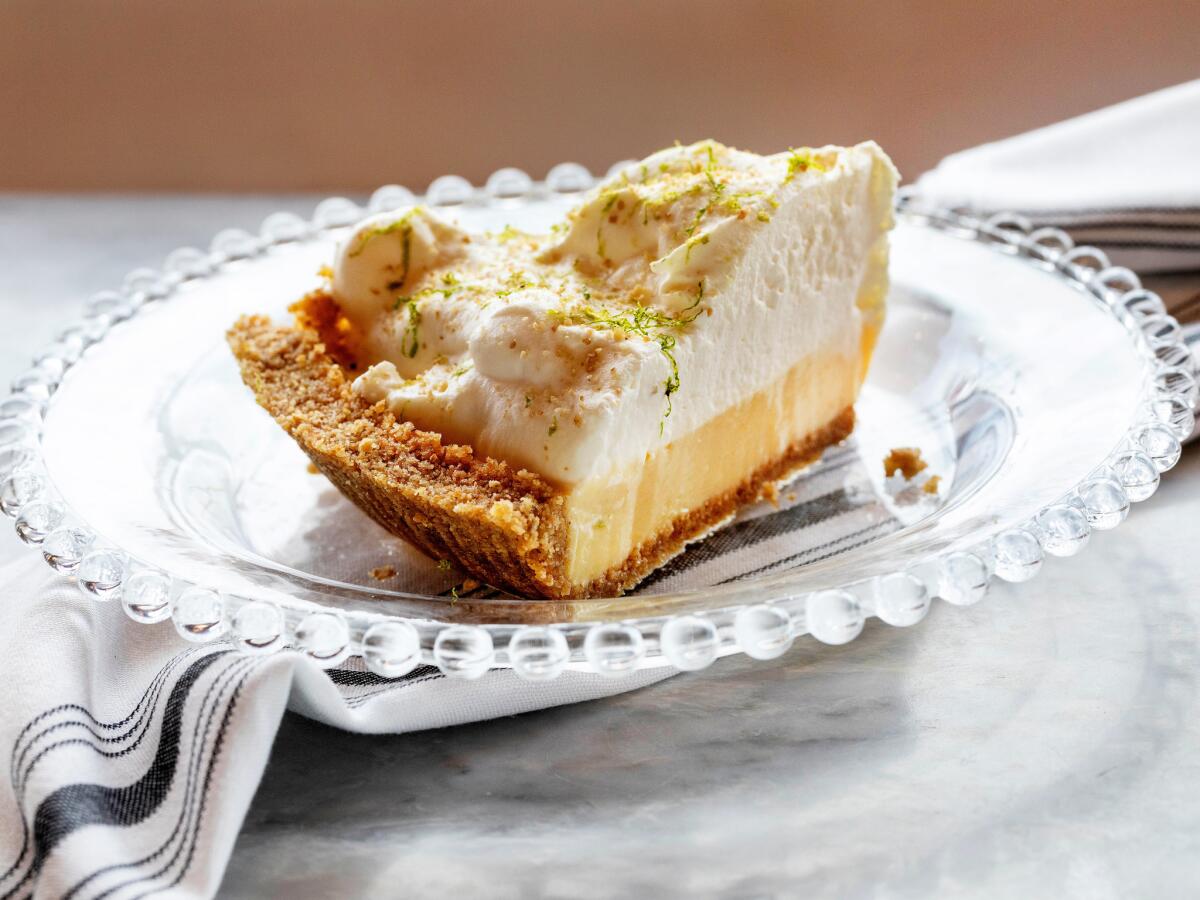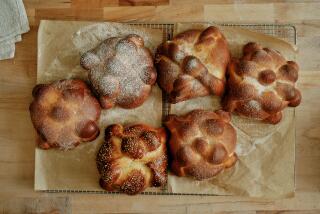Why Nicole Rucker is turning to Kickstarter to fund her new bakery

- Share via
After Fiona, her Fairfax bakery and restaurant, closed in August, Nicole Rucker was astounded by the outpouring of messages that flooded her inbox.
“Almost everyone who wrote to me said something like, ‘I wish there was a way to help’ or ‘What can I do to help?’ and I didn’t really have an answer because we were already closing,” Rucker said. “Even if Fiona wasn’t busy enough to stay open, I could see that we at least had a place in the hearts of a few hundred people.”
Though the ill-fated Fiona had served its last slice of Key lime pie, Rucker already had her sights on a new project: a pie shop and dessert counter at Grand Central Market called Fat + Flour, named for both the building blocks of pastry dough and for a cooking blog the San Diego native started in 2006.
“I’ve actually wanted to open in Grand Central Market for years, going back to when I worked for the Gjelina group. It has such a special history and vibrancy to it,” she said.
Following a successful holiday season pop-up at the downtown market, Rucker announced that Fat + Flour would soon occupy a permanent stall there, slated to open in June.
The only question left was how to pay for it.
Traditionally, Rucker — along with a majority of chefs and restaurant owners these days — would have turned to outside investors for financing. But the longer she and husband Blaine Rucker studied the numbers, the more she believed it would be feasible to fund Fat + Flour through other means.
“We knew that we could do most of the build-out ourselves, probably for around $100,000, which seemed like an attainable amount of money for opening a brick-and-mortar,” Rucker said.
“We could have taken money from investors, we could have applied for high-interest small business loans, but ultimately we realized that the best chance for success was to give people the opportunity to invest in what we’re doing.”
Key lime pie is typically a collection of supermarket convenience foods: canned condensed milk, bottled lime juice, pre-made graham cracker crust.
Last week, Rucker launched a Kickstarter campaign for Fat + Flour seeking to raise $60,000 for construction, equipment and other expenses. Combined with a $16,000 business loan from Paypal and her personal savings, she believes that it will provide enough money to open the shop.
“Asking for money with no possibility of return is uncomfortable in a way, but I’ve found that people out there want some way to actively support us,” she said. “That was the lesson from Fiona.”
The Kickstarter, which runs until the end of March, raised more than $30,000 in its first three days. Rucker said a majority of donations so far were at the $20 level, the reward for which is two complimentary slices of pie and drinks.
“We’re basically trading 600 slices of free pie for money in advance,” she said.
Fat & Flour is far from the first L.A. food business to use a crowdfunding platform like Kickstarter. In 2015 Roy Choi and Daniel Patterson netted $128,103 to open their community-minded fast-food chain Locol using Indiegogo. That same year, Nguyen Tran sought to raise $500,000 for a new location of his longtime pop-up Starry Kitchen (the fundraiser fell short), while Ari Taymor and Ashleigh Parsons of the now-closed Alma raised just over $40,000 to keep their downtown restaurant open and fend off a lawsuit from a former business partner.
More recently, Botanica in Silver Lake, All Flavor No Grease in Watts and Laurent Quenioux of pop-up LQ @ Ma Maison have all raised money through crowdfunding campaigns.
Given recent discussions around student loan debt and the rise of political campaigns financed exclusively by individual donors, the notion of opening a food business without accumulating massive debt or relying on deep-pocketed backers seems pertinent in the restaurant industry, notorious for its razor-thin margins and failure rate.
Still, Rucker understands the skepticism some might express when an acclaimed pastry chef — and author of a popular baking cookbook — asks for donations.
“I had someone say to me, ‘You’re so established, why do you need a Kickstarter?’” Rucker said. “But just because I’m established doesn’t mean I’m wealthy. I’ve been a cook most of my life so I don’t have much savings, and what I do have I’m putting into this project because I believe in it.”
Rucker sees similarities between Fat + Flour’s funding campaign and the methods of famed Central Valley peach orchard Masumoto Farms: “I sponsor a peach tree at Masumoto every year. I give them my money and they care for the tree and when it’s ready I go get the fruit. Putting your money behind something you want to see happen in the development stage is just as important as waiting until it’s being offered for sale.”
When Fat + Flour opens this summer, Rucker plans to sell a focused selection of her signature desserts, with most items between $4 and $6: seasonal fruit and cream pies, hand pies, cookies, brownies, cakes and maybe cupcakes, too, because she believes “cupcakes need to come back.”
She’ll expand her menu to include vegan and gluten-free options and plans to offer savory items as well. Daily specials will make use of the market’s broad array of vendors: cheese from DTLA Cheese, sausage from Belcampo Meats Co., spices from Chile Seco and dried fruit and nuts from La Huerta Candy. She’ll aim to avoid using single-use plastics as packaging. In short, the business will prioritize the things that Rucker views as important.
“One way or another, I would have gotten the money to open,” she said. “The point of doing it this way is that it’s on my own terms. There’s no substitute for that.”
More to Read
Eat your way across L.A.
Get our weekly Tasting Notes newsletter for reviews, news and more.
You may occasionally receive promotional content from the Los Angeles Times.










